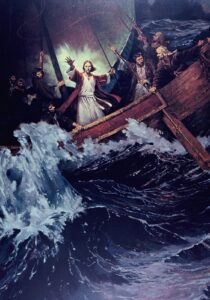 2nd Sunday before Lent St Andrew’s Milngavie
2nd Sunday before Lent St Andrew’s Milngavie
Today we celebrated the 2nd Sunday before Lent accompanied by Abigail.
This Week
Tuesday 10am – Prayer Group in the Garden Room
Thursday 10am – Said Holy Communion followed by coffee in Friendship House.
Readings for next Sunday – Sunday before Lent – Exodus 34:29-35 2 Corinthians 3:12:-4:2 Luke 9:28-36
Today’s readings – Gen 2:4b-9,15-end, Revelation 4:1-11, Luke 8:22-25
Since 2015, the Met Office has been naming storms that it considers will have a medium or high impact potential in the UK. Apparently, anyone can suggest a storm name and the Met Office receives thousands of ideas each year. The Met office believe naming each storm increases the level of public safety as people are more likely to remember and respond to warnings when storms are named.
Out and about walking this week I continue to be reminded of the most recent storm Eowyn as trees lie on their sides and paths are blocked.
Storms aren’t just about weather……
On the world stage worrying storms of war and unrest continue to rage, rumble and abate.
At home I’m sure we all have our own domestic and personal storms to face and cope with.
The gospel reading this morning describing Jesus calming the storm has always been a favourite of mine. I can remember as a child reading it from the children’s illustrated Bible, enjoying the dramatic picture of the disciples in the boat surrounded by huge waves and Jesus standing at the stern calmly commanding the waves to be still – trying to create order from chaos, ordering the waves as he stands in the boat and stills the storm.
In the Bible the sea is often thought of as a place of chaos and disorder, threatening God’s good purposes.
The people of the OT spoke of God stilling the raging of the waves and saving those in danger on the sea. Here the disciples see Jesus doing the same things, and in his wider ministry Jesus calms storms not only at sea but also in the lives of those he heals and delivers from their demons.
Such authority prompts the disciple to ask who this man is.
“Who is this?” they asked one another in fear and amazement, “He commands even the winds and the water, and they obey him.” Luke 8:25
Gradually they will come to understand the nature of God’s purposes and work in Jesus. But this story illustrates the slow and painful progress of the disciples. They have left everything to follow Jesus. For some time now they have listened to his teaching and witnessed his powers to heal. They acknowledge him as their master. But the storm on the Sea of Galilee seems to blow away everything they have learnt.
“Where is your faith? “Jesus asks. Luke 8:25
Panic has driven trust from their hearts. This isn’t the only time the disciples fail in faith and understanding. Often Jesus rebukes them, but he perseveres with them and continues to entrust his mission to them.
The God we see in Jesus is the stiller of storms.
God wills harmony for the world and peace for all our hearts. But storms rage on, around us, and within us. So why isn’t the God who through Jesus stilled the storm more obviously at work in the world today? Although the question is notoriously hard to answer our faith does offer us a way forward.
Storms in our own lives can all too easily undermine our trust in God and make us panic, like the disciples. But the disciples are rebuked for their lack of faith, not for calling out in their genuine need.
So, when our lives are in danger of being swamped by chaos or suffering of various kinds its far worse to turn away from God in bitter silence than to cry out in faith – even if it’s mingled with anger. We may then know some lessening of the storm about us, or it may be that as the storm continues, we are drawn deeper into the trusting relationship with God. The God which we see in Jesus who in this storm lies asleep like a child and trusts the father through worse storms yet to come.
From the intimacy of the Garden of Eden which we read about in Genesis this morning to the joyful worship of the heavenly court in Revelation, human beings were clearly made to live in the presence of God.
As we look beyond our own lives to the storms in God’s world today, and we don’t have to look very far, it helps to remember that what we often call miracles are usually known in the New Testament as “signs.”
Signs point to something greater than themselves. When Jesus healed, fed hungry crowds, or calmed a storm, these were pointers to something greater. A foretaste of God’s Kingdom of lasting wellbeing and peace.
So, in our daily praying for the coming of that Kingdom there is both pain and confidence: pain because of the world’s continuing storms; confidence because in Jesus God has stilled storms and the world is in His hands.
Amen
